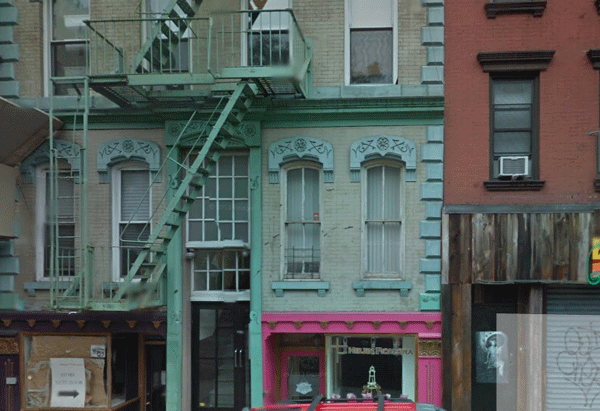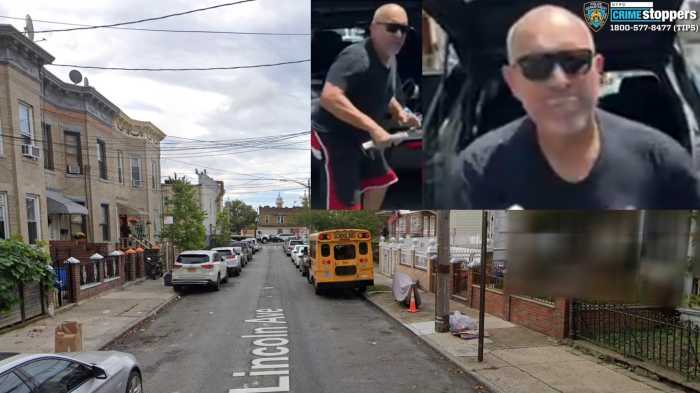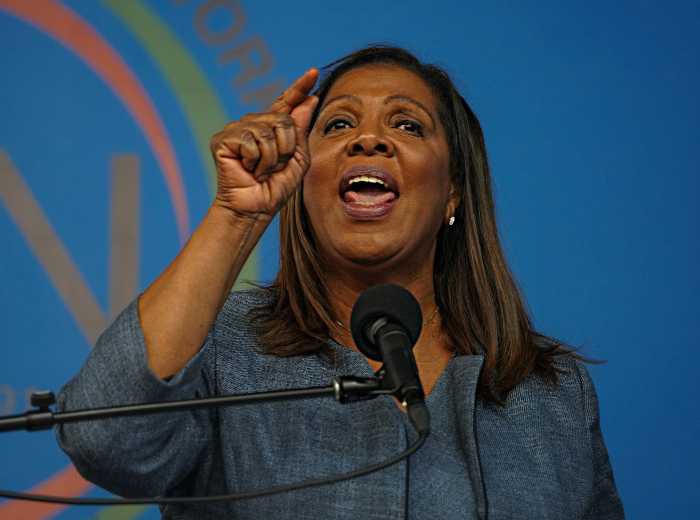BY SAM SPOKONY | Would you like to pay $4,200 a month to live in an apartment that might actually be rent-stabilized?
Probably not. In fact, you might be pretty upset with the landlord and real estate broker who tried to sell you on that deal.
And that might be why the broker who was advertising two Nolita apartments at market-rate prices hastily removed those listings on the afternoon of March 24 — just hours after this newspaper started asking about claims that both units are being unlawfully deregulated from rent-stabilization.
The apartments in question are units 1C and 3A of 19 Cleveland Place, a 16-unit building right off Petrosino Square — and they’re just two of a dozen units that some of the building’s longtime tenants, along with Manhattan Borough President Gale Brewer, believe have been illegally deregulated by Fontana Realty since it became the building’s landlord in 2000.
And, as has already been the case with many residential buildings across the city, the deregulation of 1C and 3A may have been aided by their use as alleged illegal hotel rooms.
Starting several years ago, after they had spent decades on the state’s rent-stabilization rolls, leases on both of these apartments came into the hands of former real estate partners Yaniv Toledano and Pini Azulay, according to information obtained by The Villager. The two businessmen, under their co-founded company Staynovo, then reportedly rented both units periodically on the home-sharing Web site Airbnb, which is currently in a legal battle with the New York State attorney general over possible violations of the state’s illegal hotel law (which bans rentals of fewer than 30 days in residential apartments).
Those Airbnb rentals created a shady and unsafe atmosphere within the building, according to some residents of 19 Cleveland Place, as tourists and other unidentified people strolled in and out using copies of the front-door key.
Georgette Fleischer, a longtime rent-stabilized tenant of the building and founder of the advocacy group Friends of Petrosino Square, recalled that short-term renters regularly left trash and cigarettes in the hallways, turning the building into what she called a “transient flophouse.” And in the summer of 2012, while the Airbnb rentals were taking place, the apartment next to 1C was burglarized by a still-unknown perpetrator.
Marna Lawrence, who lives in that rent-stabilized apartment and was out of town when it was ransacked in 2012, told this newspaper that, based on the unsuccessful police investigation at that time, she’s still not sure whether the crime was committed by someone connected to an Airbnb rental. But she was sure about the fact that the rentals, brokered by Toledano and Azulay, severely impacted her quality of life.
“It was just really disturbing to live next to what was basically a hotel room,” said Lawrence. “I never had any idea who was really living next to me.”
A Fontana Realty representative, who refused to identify himself during numerous phone conversations, denied that any illegal hotel use had ever taken place in the building, although he also refused to respond to questions about his alleged association with Staynovo or Toledano and Azulay.
In addition, the Mayor’s Office of Special Enforcement, which investigates illegal hotel use, has visited the building but dismissed residents’ complaints regarding such activity, according to city records. O.S.E. did not respond to request for comment.
In any case, Staynovo’s Airbnb listings for both 1C and 3A became inactive within the past year, according to searches on the Web site — and during that time, the company’s two founders parted ways, to some degree. In 2013, Azulay founded a boutique real estate firm called the Azulay Group, and Toledano around the same time founded his own new group, Novo International Realty.
In a phone interview on March 24, Azulay said he no longer has anything to do with the two units at 19 Cleveland Place. But Toledano’s Novo firm remains linked to both apartments as a broker, while Fontana Realty has apparently begun trying to lease both of them to new long-term tenants for market-rate rents.
Last week, 1C (a studio) was being advertised alongside Manhattan rentals on Novo’s Web site, and was listed at a rate of $3,500 per month. And 3A (a one-bedroom) was listed just below it, for $4,200 per month. Both rents were clearly thousands of dollars beyond what’s allowed under rent-stabilization, and would be unaffordable for the kind of middle-class tenants aided by rent-regulation.
The key question is, why were these two units — which were leased under rent-stabilization before their Airbnb period — being advertised at market rate? Did the landlord, Fontana Realty, go through the proper process of deregulation, by doing substantial renovations to the units or allowing the legal, regulated rent to eventually rise to $2,500 per month?
It’s unclear. Fontana Realty continues to refuse to answer questions on the subject, while Fleischer and Lawrence said they believe their landlord has in fact tried to flout state law and illegally deregulate the units.
The interesting part came on the morning of March 24, when this reporter called Novo to ask about the listings for 1C and 3A, in order to learn about why they were being advertised at market rate. Since Toledano was reportedly out of the country and could not be reached, Novo’s managing director, David Roy Duenias, agreed to meet with the reporter at noon that day to discuss the topic.
But when the time came to meet, Duenias was nowhere to be found. And when he was contacted once again, he had apparently changed his mind, nervously saying that he no longer had any interest in discussing the listings or their history. Minutes after that, both listings suddenly vanished from the Novo site.
The next day, a followup call to Fontana — asking about the landlord’s knowledge of the Novo listing — was once again met with a refusal to comment, along with some palpable hostility, after which the representative hung up on the reporter.
Meanwhile, New York State Homes and Community Renewal, the state agency that oversees rent regulation, has remained silent on this particular issue, primarily due to its self-imposed restrictions regarding the investigation of rent history and deregulation. Since only an apartment’s leaseholder can ask for the rent history of that unit, only Toledano or Azulay (while they held the leases) would have been able to trigger an H.C.R. investigation into the possibly illegal deregulations of 1C and 3A — something they clearly had no financial interest in doing.
The exception to that problem is H.C.R.’s relatively new Tenant Protection Unit, which announced in February that it had returned 28,000 units across the state to rent-stabilization rolls after random audits of building owners who had engaged in illegal deregulation. But the state agency has, so far, not expressed interest in doing such an investigation at 19 Cleveland Place, after multiple requests from Fleischer have gone unheeded.
H.C.R. also did not respond to request for comment when this newspaper asked about the possibility of investigating the Cleveland Place deregulations.
When it comes to illegal hotel units being passed off as being deregulated — as this newspaper previously reported has taken place at 79 Clinton St. on the Lower East Side and other Downtown buildings — Borough President Brewer said she believes the city and state need to be more proactive regarding the investigation of situations like this.
Since the city’s O.S.E. is directly responsible for investigating illegal hotels (assuming that it does successful investigations), and H.C.R. is directly responsible for dealing with rent-stabilization, it only makes sense, she noted.
“And a big issue is that H.C.R.’s Tenant Protection Unit is very understaffed, so I hope that Mayor de Blasio’s administration will take an interest in playing a greater collaborative role in this,” Brewer said. “The key is that we want more coordination between O.S.E. and H.C.R., because the way the system works right now, everything is stacked against keeping units in rent-regulation.”
For now, it may only be a matter of time before 1C and 3A — as well as numerous other units at 19 Cleveland Place — are once again listed online at unaffordable rates. And Fleischer still thinks that action from the city, regarding illegal hotels, and the state, regarding deregulation, is long overdue.
“I just feel like the city and the state have failed to do their jobs,” she said, “and they’ve failed us.”






























